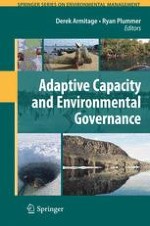2010 | OriginalPaper | Chapter
10. The Learning Dimension of Adaptive Capacity: Untangling the Multi-level Connections
Author : Alan Diduck
Published in: Adaptive Capacity and Environmental Governance
Publisher: Springer Berlin Heidelberg
Activate our intelligent search to find suitable subject content or patents.
Select sections of text to find matching patents with Artificial Intelligence. powered by
Select sections of text to find additional relevant content using AI-assisted search. powered by
